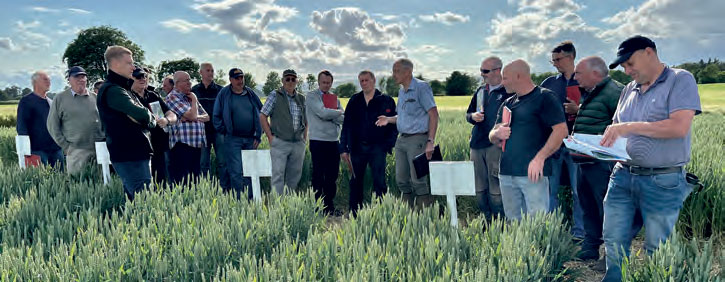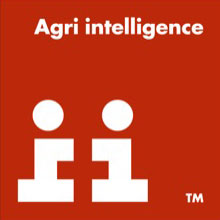This season’s iFarm events have been a resounding success. We report on the Kinross event from June to see what attracted growers.
For many growers, on-farm trials are the living proof that support a change in cropping choices, herbicide and fungicide strategies and environmental commitments.
Brothers John and James Russell of Mawhill Farm, Kinross have hosted trials as part of the Agrii iFarm network since 2020.The learnings identified in the years since have been applied across the farm.
“The objective is to identify the gains in performance that support business profitability while promoting the biodiversity that inhabits our farm,” says John Russell.
“In practice, this means studying the results of the variety trials, integrating the crop protection programmes to understand the contribution of product choices and application timings, and quantifying the value of different seed treatments to inform future decisions,” adds Mr Russell.
Wheat, barley and hybrid rye
The trials serve to remove much of the guesswork that otherwise clouds the decision-making process. Much of the number crunching behind these informed judgements is done by the Agrii R&D team with Agrii agronomist Iain Anderson providing the interpretation.
The Mawhill Farm site is valuable to Agrii because it provides central Scotland climate pressures. With wheat, barley, oats, hybrid rye and several species of cover crops sown in plots for demonstration and trial purposes, the site gives local growers the opportunity to look at new varieties under challenging weather conditions.
“The winter barley plots have attracted interest because the candidates for this season are especially strong. Bolivia, a 2-row feed which Agrii has classified as a high in its variety sustainability index, and LG Caravelle, another 2-row feed with a high sustainability score, especially show suitability for central Scotland,” says Mr Anderson.
For 6-row winter barleys, the choice is more limited. “KWS Feeris is a conventional variety with tolerance to barley yellow dwarf virus (BYDV) but lacks the yield potential of hybrids.

SY Kingsbarn has only a medium sustainability rating, but is the highest yielding variety on this site, as it often is elsewhere; its medium straw strength means it receives three plant-growth regulators,” says Mr Anderson.
The winter wheat trials provide more than just variety assessments. For Jim Carswell, Agrii R&D manager for the north, the fungicide timings and seed treatment trials specifically serve as a useful opportunity to counter the threats that undermine efforts to deliver high-yielding crops.
“The 2022-23 season will be remembered for its higher disease and lodging pressures than previous seasons which tested varieties under different input programmes. The differences between varieties and treatment programmes, was telling,” says Mr Carswell.
“Growers in Scotland face little in the way of new variety choices, but some offer hope. Skyscraper is a known quantity to many but can be viewed as becoming outclassed. Of the alternatives, RGT Bairstow is a possible successor. It has a similar disease profile, distilling approval and higher yield potential.
“Alternatives include LG Tapestry which is a soft feed variety rated medium for distilling with a good disease profile but watch for mildew, or SY Insitor. It’s a hard feed, has good Septoria resistance and has done well in dry seasons but is poorer for yellow rust.”

Nutritional seed treatments are often an essential means of promoting good establishment rates and early vigour, but the single purpose dressings should be seen as more the first line of disease protection.
“Vibrance Duo (fludioxonil + sedaxane) should be considered the standard seed treatment for winter wheat offering good control of soil and seedborne diseases along with early root and shoot promotion which is important in the north where cooler autumn conditions generally start earlier than in other parts of the country.
“Micro-nutrient and biostimulant seed treatments too are worthy of inclusion, depending on the situation, Take-off + i-Man + Rancona i-Mix offers a great deal more and we have seen yield gains of up to 0.5 t/ha versus SPD alone in spring barley,” says Mr Carswell.
As a crop, hybrid rye gained significant traction among growers when anaerobic digestion was introduced to the UK, but this has since slowed. The construction of new AD sites as part of a national push for more local sources of energy is expected to give the sector a boost and stimulate renewed interest in the crop.

“Hybrid rye has a lot to offer as a wholecrop silage. It’s early to harvest, produces high dry matter yields, is a suitable second cereal but with lower input needs. When viewed in the round, this is likely to drive interest among growers,” says Ben Lowe, Agrii national forage product manager.
“For some years, Helltop was very much the benchmark, but regional Agrii R&D trials have highlighted next generation varieties suited to Scotland and AD especially. Astranos has emerged as the obvious successor. It has fantastic yields, excellent standing power and good resistance to mildew and brown rust,” says Mr Lowe.
More than just demo plots
For John and James Russell, the opportunity to see how these crops and treatments perform on their farm under much the same management regime that they follow is highly valued.
“They’re a useful outlook on to a world of gradual change where gains are refined over the course of several seasons. The popularity of the open evenings suggests that others appreciate the opportunity to see what happens. If this is the benefit of our neighbours and the industry across the region, then we are happy to have played a supporting role,” says James Russell.


